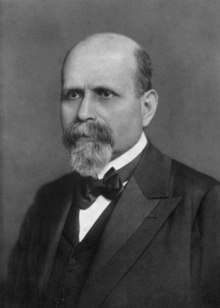Moriz Winternitz
Moriz Winternitz (Horn, December 23, 1863 – Prague, January 9, 1937) was a scholar from Austria who began his Indology contributions working with Max Müller at the Oxford University.[1][2] An eminent Sanskrit scholar, he worked as a professor in Prague in the German part of Karl-Ferdinands-Universität after 1902, for nearly thirty years.[2][3] His Geschichte der indischen Literatur over 1908-1922 period was a major and comprehensive literary history of Sanskrit texts.[4] The contributions on a wide range of Sanskrit texts by Winternitz have been an influential resource for modern era studies on Hinduism, Buddhism and Jainism.[5]

Education
An Austrian Orientalist, he received his earliest education in the gymnasium of his native town, and in 1880 entered the University of Vienna, receiving the degree of Doctor of Philosophy in 1886. In 1888 he went to Oxford, where until 1892 he assisted the preparation of the second edition of the Rig-Veda (4 vols., Oxford, 1890–92), collating manuscripts and deciding on the adoption of many new readings. Winternitz remained in Oxford until 1898, acting in various educational capacities, such as German lecturer to the Association for Promoting the Higher Education of Women (1891–98), librarian of the Indian Institute at Oxford (1895), and frequently as examiner in German and Sanskrit both for the university and for the Indian Civil Service.
Work
In 1899 he went to Karl-Ferdinands-Universität in Prague as privatdozent for Indology and general ethnology, and in 1902 was appointed to the professorship of Sanskrit (made vacant by the retirement of Ludwig) and of ethnology. The Winternitz family were friendly with Albert Einstein, when he was in Prague around 1911.
Rabindranath Tagore visited Prague in 1920 and met Winternitz. On an invitation from the poet, he went to Santiniketan and worked as a visiting professor from February 1923 to September 1924.[6]
Among his students were Vincenc Lesny, Wilhelm Gampert and Otto Stein, who themselves went on to become prominent Indologists.
In addition to valuable contributions on Sanskrit and ethnology to various scientific journals, Winternitz edited the Apastambiya Gṛihyasutra (Vienna, 1887) and the Mantrapaṭha, or the Prayer-Book of the Apastambins (part i, Oxford, 1897); translated Müller's Anthropological Religion and his Theosophy, or Psychological Religion into German (Leipzig, 1894–95); and published Das Altindische Hochzeitsrituell (Vienna, 1892), which also contains valuable ethnological material; A Catalogue of South Indian Manuscripts Belonging to the Royal Asiatic Society of Great Britain and Ireland (London, 1902); and Geschichte der Indischen Literatur (part i, Leipzig, 1905).
See also
- Moriz Winternitz (Longer biography, in German)
- Wilhelm Winternitz
References

- Douglas McGetchin (2010), Indology, Indomania, and Orientalism: Ancient India's Rebirth in Modern Germany, Fairleigh Dickinson University Press, ISBN 978-0838642085, page 107
- Isidore Singer and Cyrus Adler, The Jewish Encyclopedia: Talmud-Zweifel at Google Books, Volume XII, Article on Winternitz, Moriz
- Robert Grafrik (2015), Postcolonial Europe? Essays on Post-Communist Literatures and Cultures, Internationale Forschungen Zur Allgemeinen Und Vergleichenden Literaturwissenschaft (Editor: Dobrota Pucherova), Brill Academic, ISBN 978-9004303843, page 286
- Sheldon Pollock (2003), Literary Cultures in History: Reconstructions from South Asia, University of California Press, ISBN 978-0520228214, page 5-6
- Brian Black and Dean Patton (2015), Dialogue in Early South Asian Religions: Hindu, Buddhist, and Jain Traditions, Ashgate, ISBN 978-1409440123, pages 79-80 with footnote 2, 81 with footnote 10, Text link1, Text link2, Text link3
- "Moriz Winternitz (1863-1937". Great Personalities. Visva Bharati. Retrieved 15 August 2019.